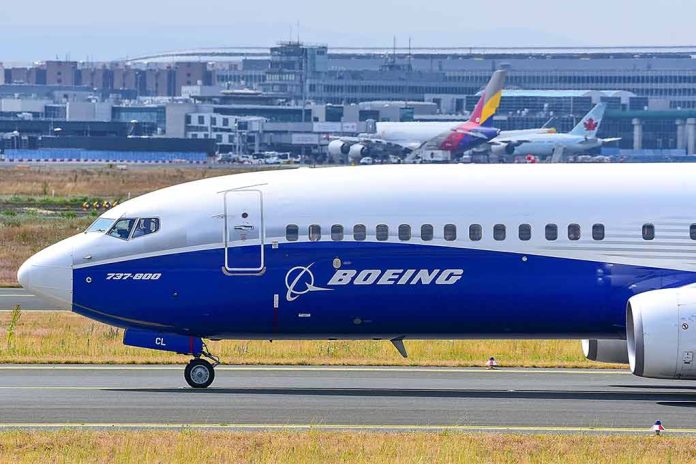
Boeing admits to criminal fraud in a $1.1 billion settlement with the DOJ, avoiding prosecution for deliberately misleading regulators before two 737 MAX crashes that killed 346 people.
Key Takeaways
- Boeing will pay $1.1 billion, including $487.2 million in fines and $444.5 million for victim compensation, to avoid criminal prosecution
- The company admitted to conspiring to defraud the Federal Aviation Administration (FAA) regarding the 737 MAX aircraft
- Boeing must invest $455 million in safety and compliance improvements as part of the settlement
- Board members are required to meet with families of the 346 victims who died in the Lion Air and Ethiopian Airlines crashes
- A federal judge has vacated the trial that was scheduled for June 23 but must still approve the final settlement terms
Boeing’s Admission of Guilt and Financial Penalties
Boeing has signed a $1.1 billion non-prosecution agreement with the Department of Justice, admitting to criminal fraud in deceiving federal regulators about the safety of its 737 MAX aircraft prior to two deadly crashes. The agreement, finalized on May 29 and disclosed in a June 4 SEC filing, allows the aerospace giant to avoid criminal prosecution while taking responsibility for its actions. U.S. District Judge Reed O’Connor has vacated the trial date that was originally set for June 23 in Fort Worth, Texas, following a joint request from Boeing and the DOJ.
The settlement breaks down into three major financial components: $487.2 million in fines, $444.5 million for a fund to compensate families of crash victims, and $455 million dedicated to improving safety and compliance systems. This comprehensive package represents one of the largest corporate settlements in recent years and reflects the gravity of Boeing’s misconduct in the certification process of the 737 MAX aircraft, which ultimately led to the deaths of 346 people in two separate crashes in 2018 and 2019.
#Boeing has reached a non-prosecution agreement with the U.S. Department of Justice (#DOJ), allowing it to avoid criminal prosecution over the two deadly #737MAX crashes (#LionAir and #EthiopianAirlines) in 2018 and 2019 that killed 346 people.
📷©️AP | REUTERS/Tiksa Negeri#US pic.twitter.com/Sf1SQlab4D
— FlightMode (@FlightModeblog) May 28, 2025
Victim Compensation and Corporate Accountability
A distinctive element of the settlement requires Boeing’s board members to engage in direct dialogue with the families of crash victims, an unprecedented step in corporate accountability for aviation disasters. The DOJ has informed families of the victims about the motion to dismiss the criminal fraud charge against Boeing, in accordance with the federal Crime Victims’ Rights Act. However, Judge O’Connor still must approve the final settlement and could potentially reschedule the trial if he disagrees with the terms of the deal.
“Boeing is committed to complying with its obligations under this resolution, which include a substantial additional fine and commitments to further institutional improvements and investments,” Boeing said in a statement. “The resolution also provides for substantial additional compensation for the families of those lost in the Lion Air Flight 610 and Ethiopian Airlines Flight 302 accidents. We are deeply sorry for their losses, and remain committed to honoring their loved ones’ memories by pressing forward with the broad and deep changes to our company that we have made to strengthen our safety system and culture.”
Many family members of victims have expressed frustration with the settlement, arguing that individual executives should face personal criminal charges rather than allowing the corporation to resolve the matter through financial penalties. The non-prosecution agreement has sparked debate about whether corporate accountability should extend beyond financial settlements to include personal liability for decision-makers whose actions contributed to fatal outcomes.
Boeing’s Path Forward and Safety Reforms
The settlement builds upon a prior 2021 agreement between Boeing and the DOJ, reflecting the company’s ongoing efforts to restore trust and accountability following the devastating crashes. As part of the new agreement, Boeing’s $455 million investment in safety and compliance represents a significant commitment to fundamental changes in how the company approaches aircraft certification and safety protocols. This comes at a critical time when Boeing faces additional scrutiny over quality control issues with other aircraft models.
“The settlement secures meaningful accountability, delivers substantial and immediate public benefits, and brings finality to a difficult and complex case whose outcome would otherwise be uncertain,” the government stated in their filing.
For conservative Americans concerned about corporate accountability and government oversight, this case raises important questions about the balance between allowing American aerospace manufacturers to compete globally while ensuring rigorous safety standards. The settlement represents a significant financial penalty that impacts Boeing’s bottom line, but avoids a potentially devastating criminal conviction that could have permanently damaged the company’s ability to secure government contracts and maintain its position as a major U.S. employer and exporter.




